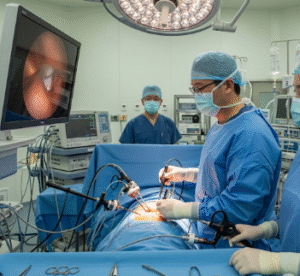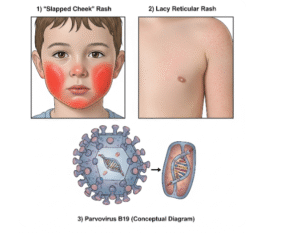What it is
Cervical cancer treatment coordination is a comprehensive, multidisciplinary approach to managing cervical cancer, ensuring that patients receive the right diagnosis, treatment, and follow-up care in a seamless and well-organized manner.
In Korea, treatment coordination is a cornerstone of cancer care, combining oncology, gynecology, surgery, radiology, and supportive care teams to create an individualized treatment plan. This approach not only improves survival outcomes but also provides emotional and holistic support for patients and their families.
➡️ Key aspects of treatment coordination:
- Multidisciplinary team (MDT) collaboration
- Individualized treatment plans based on stage, health, and fertility goals
- Integration of surgery, chemotherapy, radiotherapy, and supportive therapies
- Patient-centered support including counseling, nutrition, and rehabilitation
Why it’s done
Cervical cancer is a leading gynecologic cancer worldwide, but early detection and proper treatment coordination significantly improve outcomes. Without organized care, patients may face delays, fragmented treatments, or unnecessary stress.
✔️ Goals of treatment coordination include:
- Accurate diagnosis and staging for proper treatment planning
- Timely access to surgery, chemotherapy, or radiation
- Fertility preservation when possible in younger patients
- Holistic care addressing physical, emotional, and social needs
- Efficient communication among all specialists involved
✔️ Benefits of coordinated care:
- Higher survival and remission rates
- Reduced complications and side effects
- Improved emotional well-being for patients and families
- Better quality of life during and after treatment
Alternatives
While coordination is ideal, some patients may face care without it. Alternatives may include:
🔹 Single-specialist care:
- Treatment managed by a gynecologist or oncologist alone
- Can be effective but risks overlooking multidisciplinary input
🔹 Fragmented care:
- Patients move between hospitals or specialists without centralized planning
- May lead to duplication of tests, inconsistent treatments, or delays
🔹 International care travel:
- Some patients seek treatment abroad without coordinated follow-up at home
- Effective in advanced centers, but challenging without local support
➡️ Note: Coordination remains the best practice for cervical cancer care, especially in Korea where hospitals are designed for multidisciplinary integration.
Preparation
Preparation for treatment coordination involves both medical and emotional readiness.
➡️ Medical preparation:
- Diagnostic tests: Pap smear, HPV testing, colposcopy, biopsy
- Imaging: MRI, CT scan, or PET scan for staging
- Blood tests and overall health screening
➡️ Personal preparation:
- Gathering medical records for team review
- Preparing questions and preferences (fertility, lifestyle, financial concerns)
- Arranging family or caregiver support
➡️ Mental preparation:
- Understanding that cervical cancer treatment may involve multiple therapies over several months
- Counseling to reduce anxiety and prepare for possible lifestyle adjustments
- Emotional readiness for both treatment and recovery journey
How it’s done
In Korea, cervical cancer treatment coordination is systematic, patient-focused, and highly efficient.
✔️ Step 1 – Multidisciplinary consultation
- A team of specialists (gynecologic oncologist, radiation oncologist, medical oncologist, radiologist, pathologist, and fertility specialist if needed) reviews diagnostic results
- A personalized treatment plan is created based on cancer stage and patient needs
✔️ Step 2 – Initial treatment
- Early-stage cancer (Stage I–IIA): Surgery (radical hysterectomy, trachelectomy for fertility preservation)
- Locally advanced cancer (Stage IIB–IVA): Chemoradiotherapy as standard treatment
- Metastatic or recurrent cancer: Targeted therapy, immunotherapy, or palliative care
✔️ Step 3 – Supportive integration
- Nutrition counseling to strengthen immunity and manage side effects
- Pain management and palliative care if needed
- Psychological support for patient and family
✔️ Step 4 – Follow-up and monitoring
- Regular check-ups with imaging and lab tests
- Coordination between specialists for early detection of recurrence
- Long-term rehabilitation for physical and emotional health
✔️ Duration:
- Treatment plans vary from a few weeks (surgery alone) to months (chemoradiation + systemic therapy)
- Follow-up continues for 5+ years for recurrence monitoring
Recovery
Recovery after cervical cancer treatment depends on the therapy used but is supported by structured coordination.
➡️ Immediate recovery:
- Post-surgery: pain, temporary bladder issues, or limited mobility
- Post-radiation/chemotherapy: fatigue, nausea, or skin irritation
➡️ Physical recovery:
- Gradual return to daily activities within weeks to months
- Long-term effects like pelvic floor weakness or menopause may occur
- Rehabilitation therapies (physiotherapy, hormone therapy) offered
➡️ Emotional recovery:
- Relief from successful treatment balanced with fear of recurrence
- Counseling and support groups help women adjust
- Fertility or intimacy concerns addressed through specialist care
➡️ Key recommendations:
- Attending all follow-up visits
- Maintaining a healthy diet and regular exercise
- Emotional support through counseling or peer groups
- Open communication with medical team about side effects
Treatment option in Korea
Korea is recognized for world-class cancer care coordination, offering cutting-edge treatments and holistic patient support.
✔️ Hospital facilities:
- National Cancer Centers and university hospitals with dedicated gynecologic oncology units
- Advanced technology including robotic surgery, IMRT (intensity-modulated radiation therapy), and immunotherapy
- Integrated diagnostic, treatment, and recovery facilities under one roof
✔️ Medical expertise:
- Multidisciplinary tumor boards for every case
- Surgeons skilled in both radical and fertility-sparing procedures
- Access to international clinical trials and latest cancer therapies
✔️ Post-treatment care:
- Structured long-term follow-up for recurrence detection
- Support for fertility, menopause management, and quality of life
- Rehabilitation programs including pelvic therapy, nutrition, and emotional care
✔️ Cultural aspect:
- In Korea, cancer care emphasizes respect, dignity, and family involvement
- Patients often receive support in Sanhujoriwon-style centers, adapted for cancer recovery with nutrition, rest, and counseling
➡️ Highlight: Cervical cancer treatment coordination in Korea provides seamless multidisciplinary care, advanced therapies, and holistic recovery programs, ensuring patients receive the highest level of support from diagnosis through long-term survivorship.













